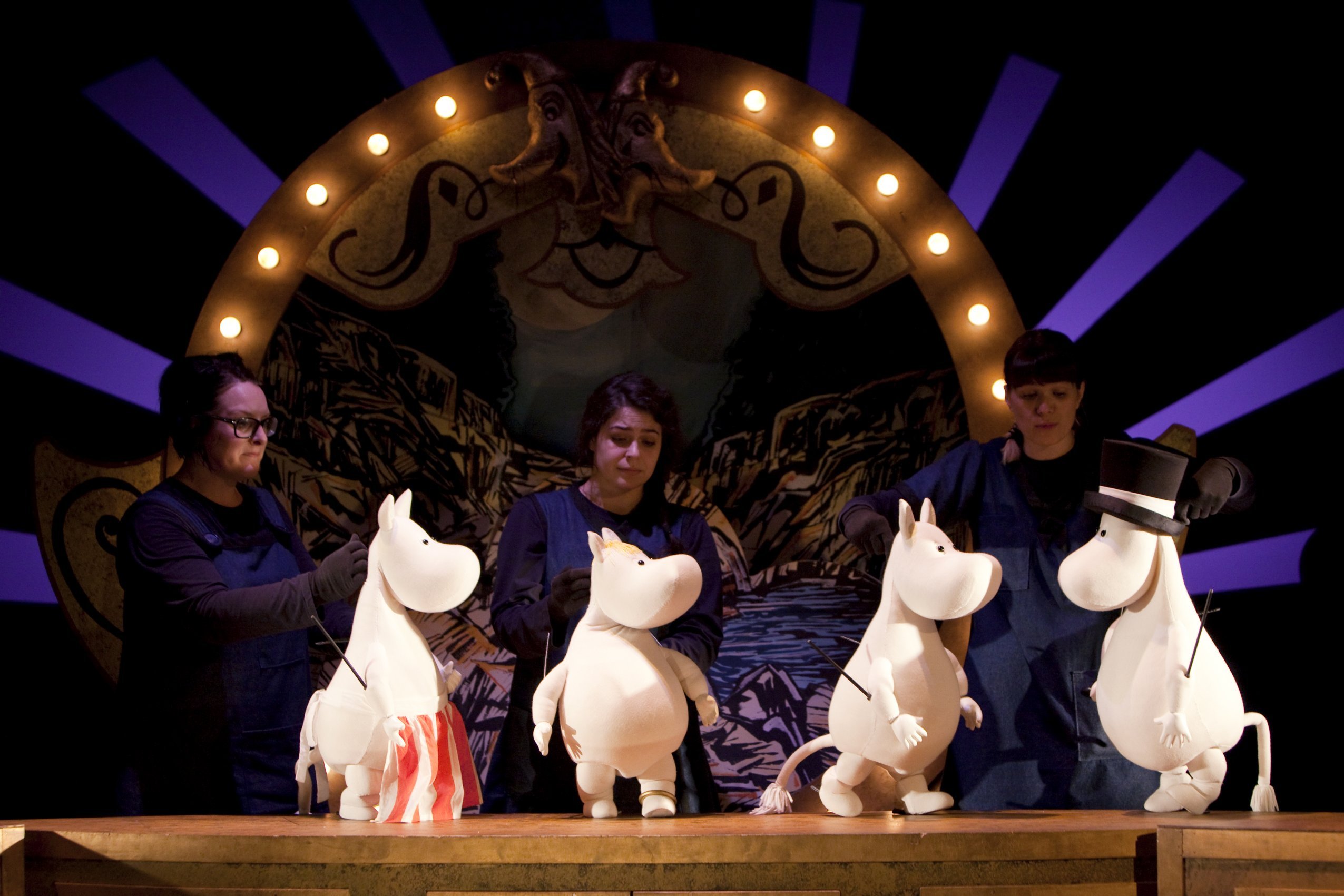
A scene from Moominsummer Madness
Passion, ambition and vision
Peter Glanville is passionate that children’s theatre should be of the highest quality attracting the best actors and creative teams.
As Artistic Director of Polka Theatre in London, I am responsible for producing and programming theatre for zero to 14 year olds throughout the year. What am I looking for? Well, most importantly, I want theatre that feels authentic to children. Stories that they can connect with, stories that resonate with them. Our audiences in London are diverse and the stories that we tell must reflect that diversity.
Our aspiration is to create high-quality productions and world-class theatre for children. We want to work with the best actors and creative teams we can find. The casting process can be difficult at times, and I still come across actors and agents who are dismissive of children’s theatre. During my time as Artistic Director at Little Angel Theatre (2005–13), we created puppet theatre for children, co-producing work with companies such as Kneehigh and the RSC but, yet again, it has not been recognised as a National Portfolio Organisation in the recent round. These attitudes and decisions all play a part in lowering the profile of the sector, as well as the morale of the people who work tirelessly within it. Despite this, the quality of theatre produced for children by companies across the UK is consistently strong and is now regarded as some of the best in Europe.
Some of the most innovative theatre being created in the UK is by children’s companies
The tides have definitely changed over the past ten or twenty years. It is encouraging that places such as the National Theatre, RSC, Young Vic and the Royal Opera House are creating more work for children. Indeed, as Lyn Gardner has pointed out, some of the most innovative theatre being created in the UK is by children’s companies such as Theatre Rites and Oily Cart. It is important that children’s theatre continues to attract and support the most talented artists.
Since joining Polka last year, I have been thinking about how we can support artists to create new and innovative work for children in an environment where they can take risks. To this end, we are establishing ‘Where theatre begins’, a national programme which will give rehearsal space, money and resources to four companies or artists to explore creating new work. Each company will be supported by a mentor and there will be no expectations of a finished piece. It is about supporting a fresh idea or approach that may or may not have wings. It is posing the question: ‘How can we create innovative theatre for children?’ It will be open to anyone – an emerging company, an established company or an individual artist. And there’s no need to have created work for children previously. This will continue to run on an annual basis from 2015 with the hope that we will be able to support many of these projects further in their development. We will also work alongside satellite theatres throughout the UK to extend its reach.
So we have lots of ambition at Polka and an artistic vision that places children at the heart of the work and the building. Sometimes this is by having artists working alongside children in the classroom, sometimes by inviting children to respond to work in development or be integrated into the production. We also have a Young Voices Panel, a group of children who meet weekly. They have been a part of some of my recent script workshops on Peter Pan, exploring the fears and expectations of growing up. They have also spent time shadowing different departments and are major contributors to architects’ plans for the building and its future. They write blogs, reviews, recommend workshops to other children in our programmes and give feedback throughout the rehearsal process.
However, the financial backdrop is difficult. Like most theatres we are being faced with cuts in public funding. In this sense, theatre for young people is very much a part of the wider theatre ecology and faces the same threats and challenges as theatres that create work for adults. As well as the pressure to sustain and build box office, we also have to promote the message that we are a charity and work hard to attract funds from private sources. The specific difficulty for most theatres presenting work for children is that ticket prices are much cheaper – because you want to make them affordable to schoolchildren and because children are economically dependent on their parents. This has an impact on the amount you can generate at the box office.
At Polka, we are determined that every child should have the opportunity to experience theatre and creative arts activities. We believe it should be a right, not an opportunity that is only open to children that have wealthy or theatre-going parents. This places even more emphasis on the importance of a diverse audience reach. We try to keep prices reasonable and have introduced Curtain up, a scheme that gives free tickets to school classes that have not visited before. We have integrated signed performances, relaxed performances and audio-described performances to ensure the work is as accessible as possible. All of these require significant subsidies which in turn have an impact on the amount of charitable fundraising work we have to undertake.
These are challenging times, but we are determined to move forward with a diverse and progressive programme of theatre and creative learning activities that can appeal to children of all ages, backgrounds and abilities.
Peter Glanville is Artistic Director of Polka Theatre.
www.polkatheatre.com
Join the Discussion
You must be logged in to post a comment.